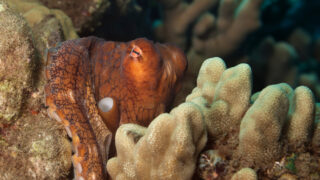
Octopus Farming Ban (Washington)
H.B. 1153
In recognition of the "advanced cognitive abilities" of octopuses, An Act Related to Prohibiting Octopus Farming, H.B. 1153, seeks to prohibit octopus aquaculture, also known as octopus farming, in Washington.
Status
The Animal Legal Defense Fund supports this bill.
Sponsors: Representative Strom Peterson (D-21)
Introduction Date: January 9, 2023
In recognition of the “advanced cognitive abilities” of octopuses, An Act Related to Prohibiting Octopus Farming, H.B. 1153, seeks to prohibit octopus aquaculture, also known as octopus farming, in Washington.
Octopus farming is inhumane and poses significant environmental and public safety concerns. Octopuses have significant cognitive ability. They can learn new skills, can navigate complex mazes, are known escape artists, and even use tools. Because of their complex mental ability, octopuses have high enrichment needs that simply cannot be met in farming environments. Keeping octopus in this manner would subject them to intense boredom and mental stress.
Octopuses are solitary creatures, viewing other octopuses as a threat. On farms, octopuses are, cruelly overcrowded into small pools together, causing significant stress, aggression, and high mortality.
No accepted humane method of slaughter currently exists for octopuses, and common, cruel slaughter practices include freezing and clubbing them to death. Octopus farming could harm the surrounding ecosystems and marine life by spreading pollution and changing water temperatures, and there is a significant risk of farmed octopuses escaping their enclosures sand and impacting local populations. Industrial aquaculture farms are breeding grounds for pathogens, and octopuses are hosts of multiple pathogens and zoonotic diseases that can spread to humans, such as cholera. The use of antibiotics, many of which are used to treat humans as well, to combat these pathogens has the potential for the creation of multi-drug resistant bacteria.
Similar legislation is currently being considered in Hawaii (H.B. 2252).
Why is this law important? H.B. 1153 is an opportunity to prohibit octopus farming in Washington before it starts. Octopus farming is a luxury industry that is unsustainable, environmentally destructive, and inhumane. Passing H.B. 1153 would ensure octopus farms, and the inherent risks that come with them, do not come to Washington state.
Coalition Support: Animal Rights Initiative, Pasado’s Safe Haven, Aquatic Life Institute, Animal Wellness Action, Center for a Humane Economy, Global Federation of Animal Sanctuaries (GFAS), Mercy for Animals, Northwest Animal Rights Network, PAWS (Progressive Animal Welfare Society), Rebellyous Foods, The Humane League, The Humane Society of the United States, Washington Wildlife First, Wild Orca
For more information about animal protection legislation in Washington and opportunities to take action for animals, visit aldf.org/Washington

